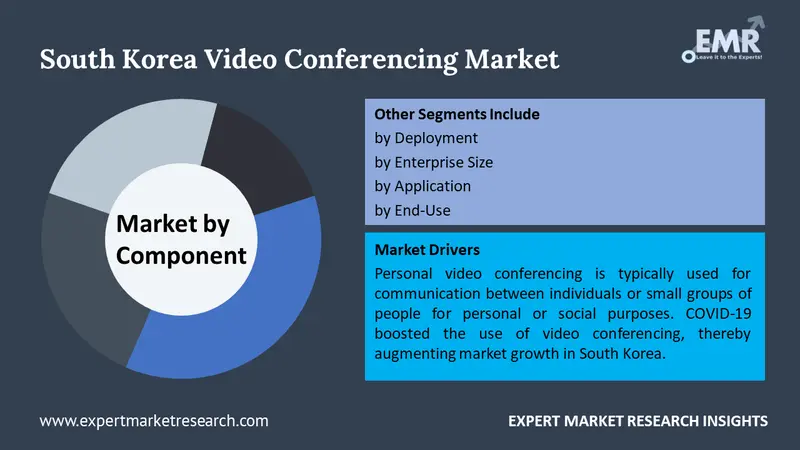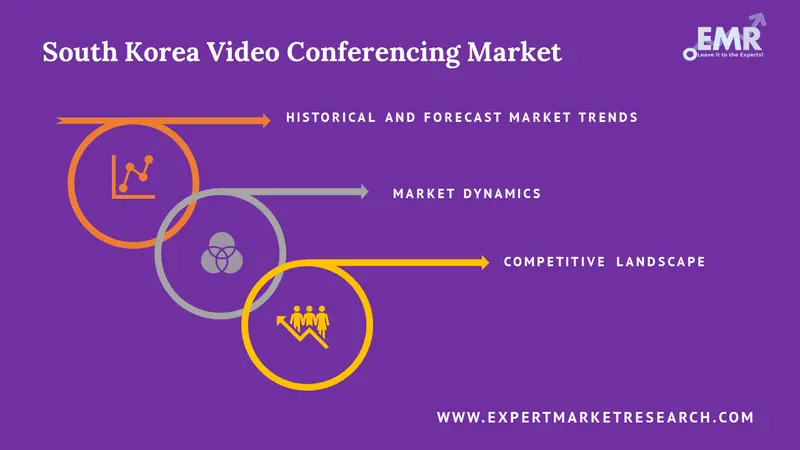
Consumer Insights
Uncover trends and behaviors shaping consumer choices today
Procurement Insights
Optimize your sourcing strategy with key market data
Industry Stats
Stay ahead with the latest trends and market analysis.
The South Korea video conferencing market is expected to grow at a CAGR of 12.40% between 2026 and 2035. Globalization, access to high-speed internet, high smartphone usage, technological advancements, a user-friendly interface, and a work-from-home culture are driving the South Korea video conferencing market. Moreover, the COVID-19 pandemic also positively impacted the growth of the video conferencing market.
Base Year
Historical Period
Forecast Period
Compound Annual Growth Rate
12.4%
2026-2035
*this image is indicative*
Through a live video and audio call, two or more people can participate in a virtual, online conference called video conferencing. While video conferencing has been used for a long time, its use in business and education increased dramatically during the COVID-19 epidemic.
Technological Advancements and Work-from-home Culture Supports the Growth of the Video Conferencing Market in South Korea
South Korea is known for technological developments and innovations, and it will continue to advance in the coming future as well, augmenting connectivity, ease of usage, video, and sound quality, among others. With the rise of the work-from-home culture, video conferencing tools are becoming more popular in the country, saving a lot of resources and money that would otherwise be spent on in-person meetings. People can now attend meetings and classes from the comfort of their homes without having to travel long distances. Other factors such as high smartphone usage, increased internet penetration, and rising disposable income also augment market growth in South Korea.
Globalisation and Improved User Experience are Making Video Conferencing Popular in South Korea
Numerous companies are now going global, which has made video conferencing tools an important part of their company’s growth. People from different time zones and locations can now connect easily, and this high demand is propelling the market players to make the interface of their video conferencing platform more user-friendly and of high quality while also improving privacy and security issues. Many video conferencing platforms now offer additional features such as management software, calendars, reminders, and email, among others. These additional features and secure video conferencing are bolstering the demand for video conferencing in South Korea.
South Korea Video Conferencing Market Report and Forecast 2026-2035 offers a detailed analysis of the market based on the following segments:
Market Breakup by Component
Market Breakup by Deployment
Market Breakup by Enterprise Size
Market Breakup by Application
Market Breakup by End-Use

Read more about this report - REQUEST FREE SAMPLE COPY IN PDF
Physical video conferencing tools, including cameras, speakers, microphones, and displays, are referred to as video conferencing hardware. Applications and systems used to hold video conferences are classified as video software. This covers both on-premises and cloud-based systems. Features like screen sharing, virtual backdrops, recording, and chat are included in video conferencing software. Support and upkeep from suppliers or other third parties are included in video conferencing services. A few of these services are setup, technical support, training, and managed services.
Due in part to the COVID-19 pandemic and the subsequent shift to remote work, the videoconferencing market has seen substantial development in recent years. As a result, there is a greater need for video conferencing equipment, software, and services, as well as for brand-new features and advancements that will improve the user experience and aid the market growth.
On-premise video conferencing may provide greater control, security, and customizability possibilities, but cloud video conferencing may be more affordable, flexible, and easy to grow. Utilizing a third-party service provider that hosts the infrastructure and software for video conferencing in the cloud is necessary for cloud video conferencing. This implies that viewers may use a web browser or mobile app to connect to the video conferencing from any location with an internet connection. Platforms for cloud video conferencing include, among others, Zoom, Microsoft Teams, and Google Meet. On-premise video conferencing, on the other hand, entails setting up and keeping up the equipment and software for video conferencing on regional services or data centres inside an organization. Both the segments are widely being used based upon the needs and resources of the user.
The expansion of the South Korea's video conferencing market has been fueled by small and medium enterprises’ (SMEs) increased adoption of video conferencing solutions to facilitate remote work and collaboration. Large businesses in South Korea may have various needs, such as more sophisticated features and better security standards when using video conferencing systems for remote communication. As a result, major businesses have always preferred on-premise video conferencing systems. On the other hand, due to limited budgets, SMEs frequently need more economical and adaptable solutions. As a result, SMEs are increasingly utilising cloud-based video conferencing solutions. Major businesses have always preferred on-premise video conferencing systems. However, in recent years, a lot more organisations have begun to use cloud-based video conferencing systems.
Video conferencing is used for both enterprise and personal applications. Enterprise video conferencing is used for communication and collaboration. It can be used for a variety of purposes, including remote work, training, client meetings, and team collaboration. Enterprise video conferencing solutions often include more advanced features than personal video conferencing. Personal video conferencing is typically used for communication between individuals or small groups of people for personal or social purposes. COVID-19 boosted the use of video conferencing, thereby augmenting market growth in South Korea.
For businesses and government organisations, video conferencing has become a crucial tool for conducting virtual meetings and presentations as well as connecting with clients and staff who are spread out across different places. Video conferencing has developed into a useful tool for instructors to communicate with students as distance learning has grown more popular. By making it possible for virtual consultations, remote diagnostics, and telemedicine services, it has also revolutionised the healthcare sector. For personal purposes, video conferencing has gained popularity as a way for friends and family members to communicate from distant locations. All these multiple uses will bolster the video conferencing market in South Korea.

Read more about this report - REQUEST FREE SAMPLE COPY IN PDF
The comprehensive EMR report provides an in-depth assessment of the market based on the Porter's five forces model along with giving a SWOT analysis. The report gives a detailed analysis of the following key players in the South Korea video conferencing market, covering their competitive landscape and latest developments like mergers, acquisitions, investments and expansion plans.
Zoom Video Communications, Inc.- A communications platform called Zoom Video Communications offers chat, audio, video, and content-sharing opportunities for users to communicate. Face-to-face video is made possible by the company's cloud-native technology, which joins individuals from different devices and places in a single conference. Serving businesses of all sizes and across all sectors worldwide, Zoom was established in 2011 and has its corporate headquarters in San Jose, California.
ECS Telecom- Enterprise voice solutions are the focus of the Korea-based business ECS TELECOM Co Ltd. System integration and consultancy, video conferencing, network integration, CC/UC, and total maintenance services are among the business sectors in which it is active in providing solutions. The company's headquarters are in Seoul, South Korea.
*Please note that this is only a partial list; the complete list of key players is available in the full report. Additionally, the list of key players can be customized to better suit your needs.*
The Others players in the industry are Haeden Bridge Co,Ltd, Lumens Digital Optics Inc., 4NB Co., Ltd, Avaya, Inc, Cisco Systems,Inc, Huawai Technologies Co.,Ltd., Microsoft Corporation, Google LLC, and Panasonic Holdings Corporation, among others.




*While we strive to always give you current and accurate information, the numbers depicted on the website are indicative and may differ from the actual numbers in the main report. At Expert Market Research, we aim to bring you the latest insights and trends in the market. Using our analyses and forecasts, stakeholders can understand the market dynamics, navigate challenges, and capitalize on opportunities to make data-driven strategic decisions.*
Get in touch with us for a customized solution tailored to your unique requirements and save upto 35%!
The market is projected to grow at a CAGR of 12.40 % between 2026 and 2035.
Technological developments and innovations, high smartphone usage, increased internet penetration, and rising disposable income are the major industry drivers.
Globalisation and improved user experience, and work-from-home culture are the leading trends of the South Korea video conferencing market.
The dominant types of components in the industry are hardware, software, and services.
The leading application types in the market are corporate, education, healthcare, government and defence, BFSI, and media and entertainment, among others.
The major players in the industry are Haeden Bridge Co,Ltd, Lumens Digital Optics Inc., 4NB Co., Ltd, Avaya, Inc, Cisco Systems,Inc, Huawai Technologies Co.,Ltd., Microsoft Corporation, Zoom Video Communications, Inc, Google LLC, ECS Telecom, and Panasonic Holdings Corporation, among others.
Explore our key highlights of the report and gain a concise overview of key findings, trends, and actionable insights that will empower your strategic decisions.
| REPORT FEATURES | DETAILS |
| Base Year | 2025 |
| Historical Period | 2019-2025 |
| Forecast Period | 2026-2035 |
| Scope of the Report |
Historical and Forecast Trends, Industry Drivers and Constraints, Historical and Forecast Market Analysis by Segment:
|
| Breakup by Component |
|
| Breakup by Deployment |
|
| Breakup by Enterprise Size |
|
| Breakup by Application |
|
| Breakup by End-Use |
|
| Market Dynamics |
|
| Competitive Landscape |
|
| Companies Covered |
|
Single User License
One User
USD 3,999
USD 3,599
tax inclusive*
Datasheet
One User
USD 2,499
USD 2,249
tax inclusive*
Five User License
Five User
USD 4,999
USD 4,249
tax inclusive*
Corporate License
Unlimited Users
USD 5,999
USD 5,099
tax inclusive*
*Please note that the prices mentioned below are starting prices for each bundle type. Kindly contact our team for further details.*
Flash Bundle
Small Business Bundle
Growth Bundle
Enterprise Bundle
*Please note that the prices mentioned below are starting prices for each bundle type. Kindly contact our team for further details.*
Flash Bundle
Number of Reports: 3
20%
tax inclusive*
Small Business Bundle
Number of Reports: 5
25%
tax inclusive*
Growth Bundle
Number of Reports: 8
30%
tax inclusive*
Enterprise Bundle
Number of Reports: 10
35%
tax inclusive*
How To Order

Select License Type
Choose the right license for your needs and access rights.

Click on ‘Buy Now’
Add the report to your cart with one click and proceed to register.

Select Mode of Payment
Choose a payment option for a secure checkout. You will be redirected accordingly.
Strategic Solutions for Informed Decision-Making
Gain insights to stay ahead and seize opportunities.

Get insights & trends for a competitive edge.

Track prices with detailed trend reports.

Analyse trade data for supply chain insights.

Leverage cost reports for smart savings

Enhance supply chain with partnerships.

Connect For More Information
Our expert team of analysts will offer full support and resolve any queries regarding the report, before and after the purchase.
Our expert team of analysts will offer full support and resolve any queries regarding the report, before and after the purchase.
We employ meticulous research methods, blending advanced analytics and expert insights to deliver accurate, actionable industry intelligence, staying ahead of competitors.
Our skilled analysts offer unparalleled competitive advantage with detailed insights on current and emerging markets, ensuring your strategic edge.
We offer an in-depth yet simplified presentation of industry insights and analysis to meet your specific requirements effectively.
Share